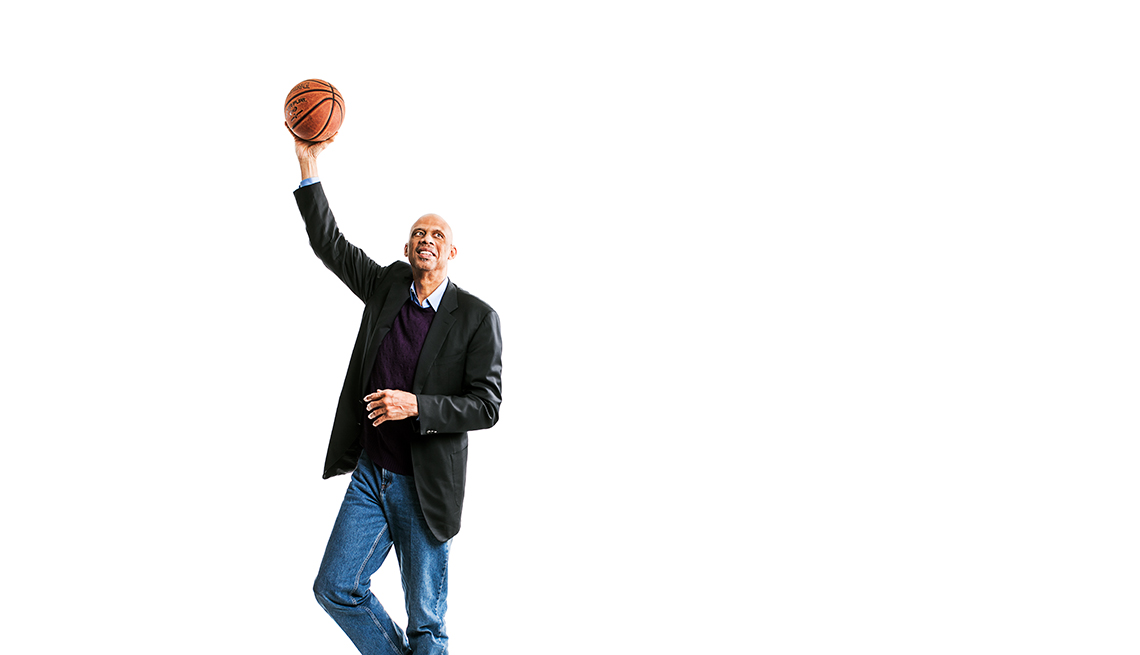A Conversation With Kareem Abdul-Jabbar
The basketball legend on what he hopes a new documentary will reveal about him and what life after basketball has taught him

Javier Sirvent
Kareem Abdul-Jabbar has decided now is the time to make the leap from hoops to storytelling.
Q: A documentary on your life will air on HBO this year. What took so long and why now?
A: Geez, I guess my reticence is why it took so long. I did my autobiography and a diary on my last year in pro basketball in 1989. It didn't deal with me, personally, and that was fine by me. But I've now lived the back end of my life. Digging through photographs, seeing what my family and friends had to say — people who have known me my whole life — it's really brought up a whole lot of things that I will share.
Q: Is it important to tell your story in your voice?
A: It is very important. So many people who have tried with regard to me don't know me or understand my history. Getting it right is important.
Q: What is the biggest misconception you hope to debunk?
A: People say that I am aloof, I don't like people or relate to them. That's so far off the mark. I am shy. I've dealt with that.
Q: At 67, you enjoy a renaissance in many genres, including movie producer and prolific writer. Is your emergence as an important voice regarding culture, race and sports in America aspirational?
A: It is, especially the writing. I was an English major at UCLA. I've always had the bug. This is a natural progression for me. I hope what I have to say is relevant.
Q: Can you tell us about the novel you are writing?
A: It is about Sherlock Holmes' older brother, Mycroft. He works undercover for the British government.
Q: The documentary you produced, On the Shoulders of Giants, paid homage to the Harlem Rens, a gifted all-black basketball team in New York in the 1920s and '30s. What was their significance to you?
A: Their sacrifice was that they let the country know that not all of the best players were in the NBA, which initially was segregated.
Q: Why do you think today's athletes won't engage in greater social causes the way you, Jim Brown, Muhammad Ali and other black athletes once did?
A: Bringing the Jim Crow era to an end was very important for most black Americans. It was a mission I inherited. That debate is over. The civil rights aspect of it — at least on the legal books — has been settled. Now we have to make it a reality in our nation.
Q: What can be done to make black youth less vulnerable and fully integrated into mainstream America?
A: The main problem is the reluctance to educate black Americans. Since the Civil War, people have been indifferent to it — including black Americans.
Q: Who was the best basketball player not named Kareem Abdul-Jabbar?
A: LeBron James is an incredible talent, but Oscar Robertson in his prime would blow people's minds today.
Q: What is the best advice you ever received from your college coach, the late John Wooden?
A: He would say, "Failure to prepare is preparing to fail."
Q: Was there a turning point in your life post-basketball?
A: When my mom died in 1997, I had to deal with a lot of new things. I didn't know my dad had senile dementia; my mom wouldn't tell me because she didn't want me to worry. I had issues with my kids because, for so much of their lives, I was not there.
Q: Six years ago, you were diagnosed with a form of leukemia. Did that change your outlook on life? How is your health?
A: It changed how I was appreciating the clock. My health is good. I'm very fortunate that the type of leukemia I have can be treated. If this had happened 12 years ago, I would have had a death sentence.
Q: What is your blueprint for getting older?
A: The continued pursuit of goals and dreams and, realistically, connecting with family and friends. That is where the real joy in life is.
Jon Saraceno is a freelance journalist who covered the NBA for USA Today.
Also of Interest
- Interview with President Barack Obama
- Melinda Gates: A conversation with the impatient optimist
- Why you shouldn't drop your landline just yet
- Help bring relief to struggling seniors; find volunteer opportunities near you
Join AARP Now — Receive access to exclusive info, benefits and discounts
